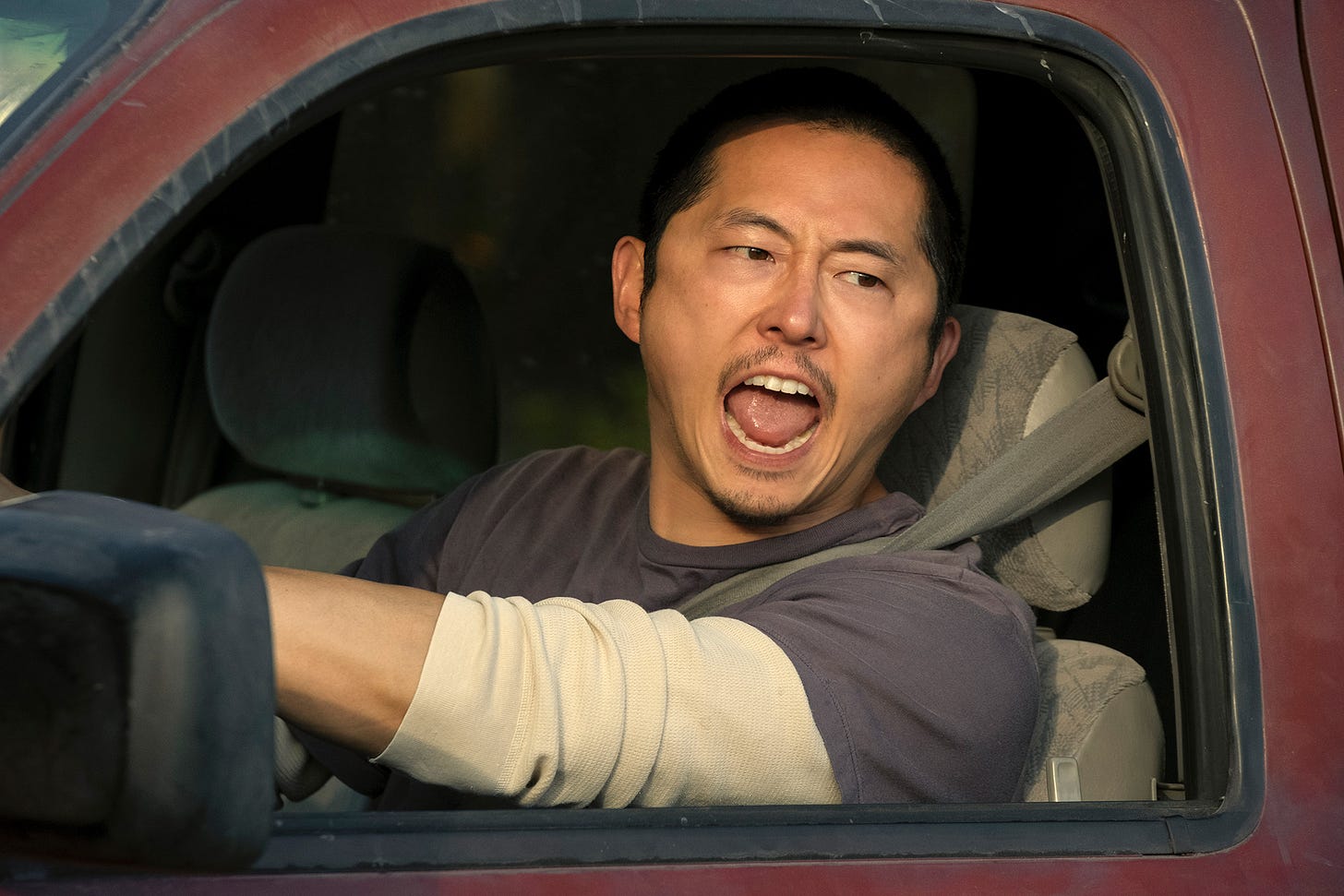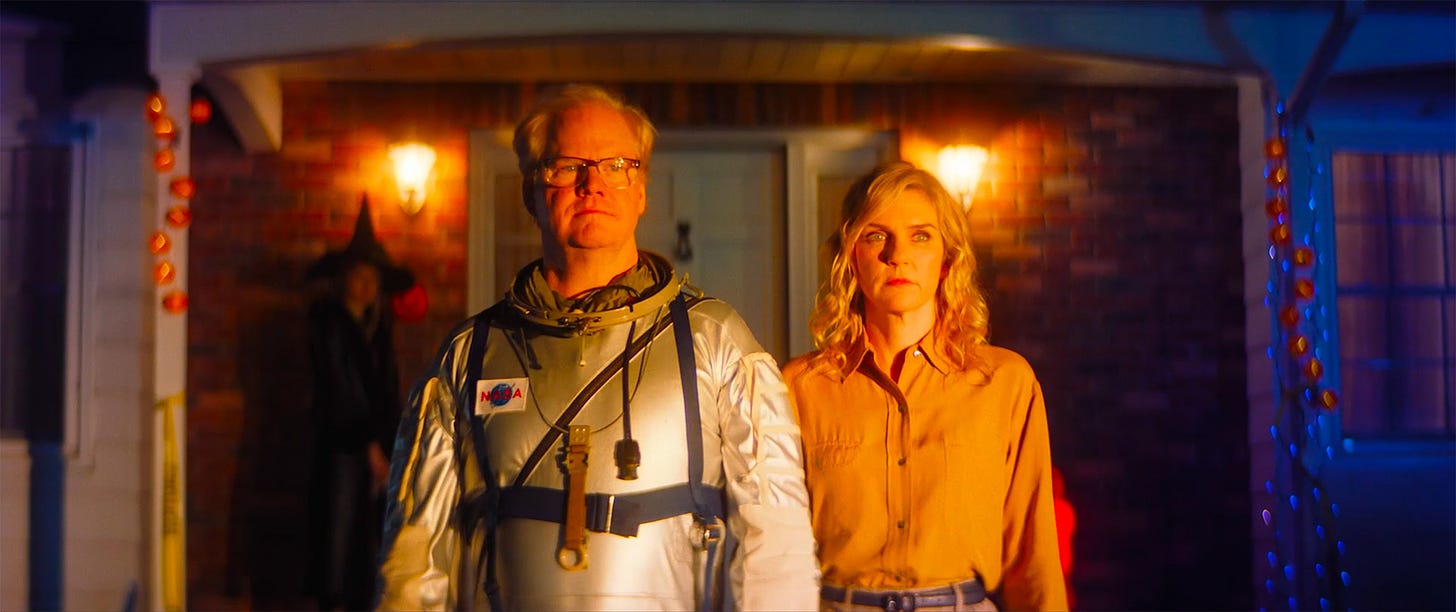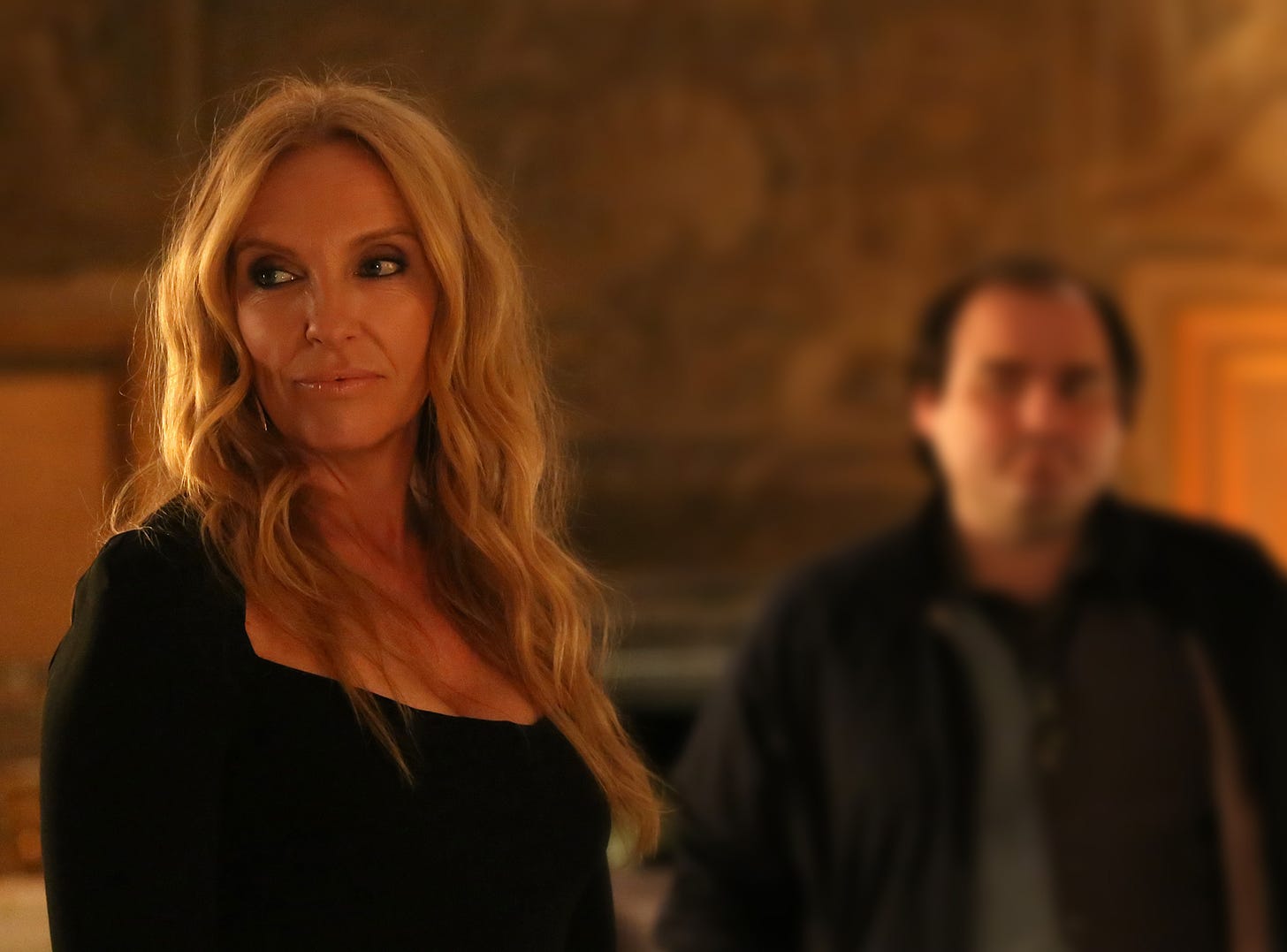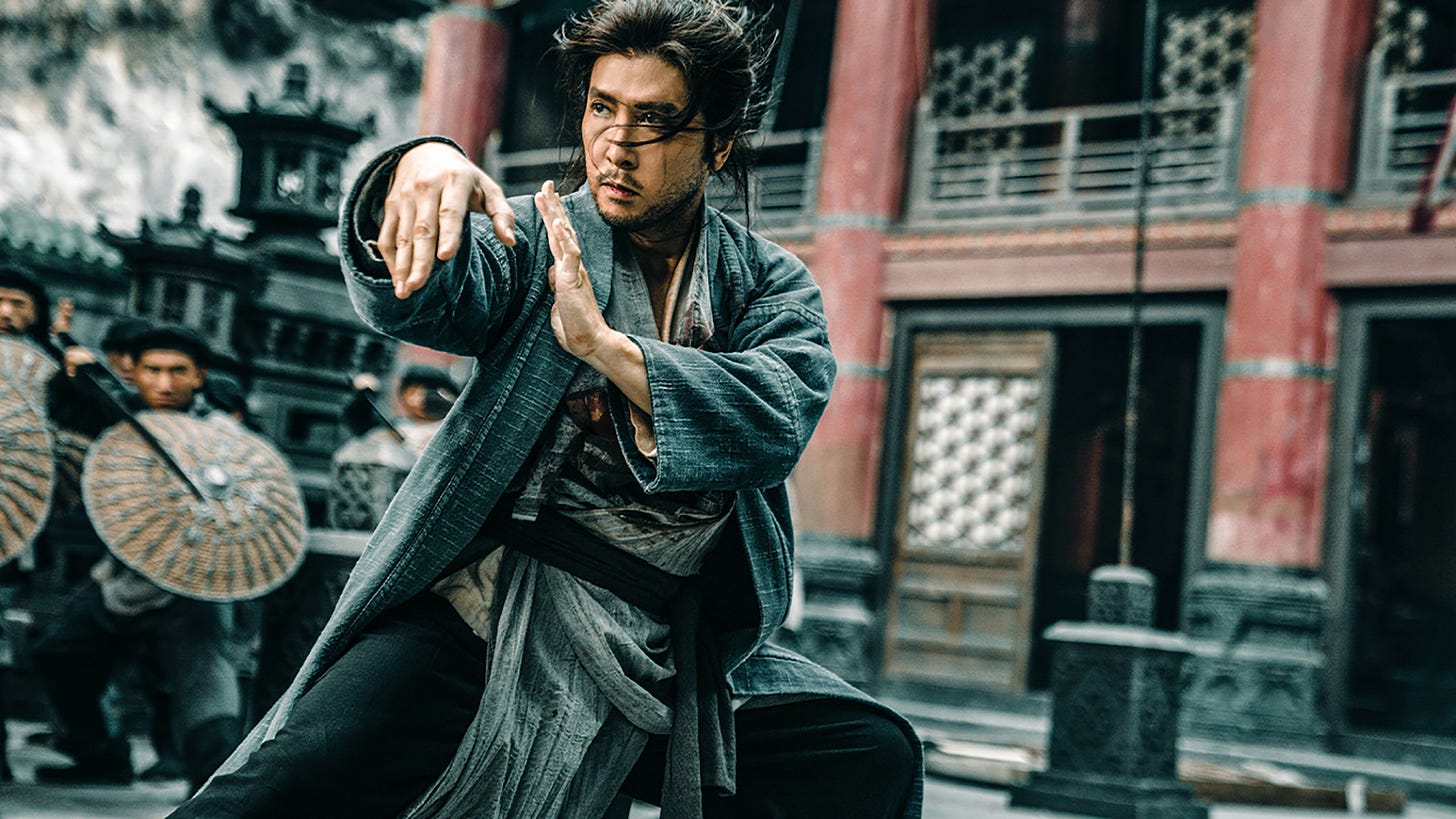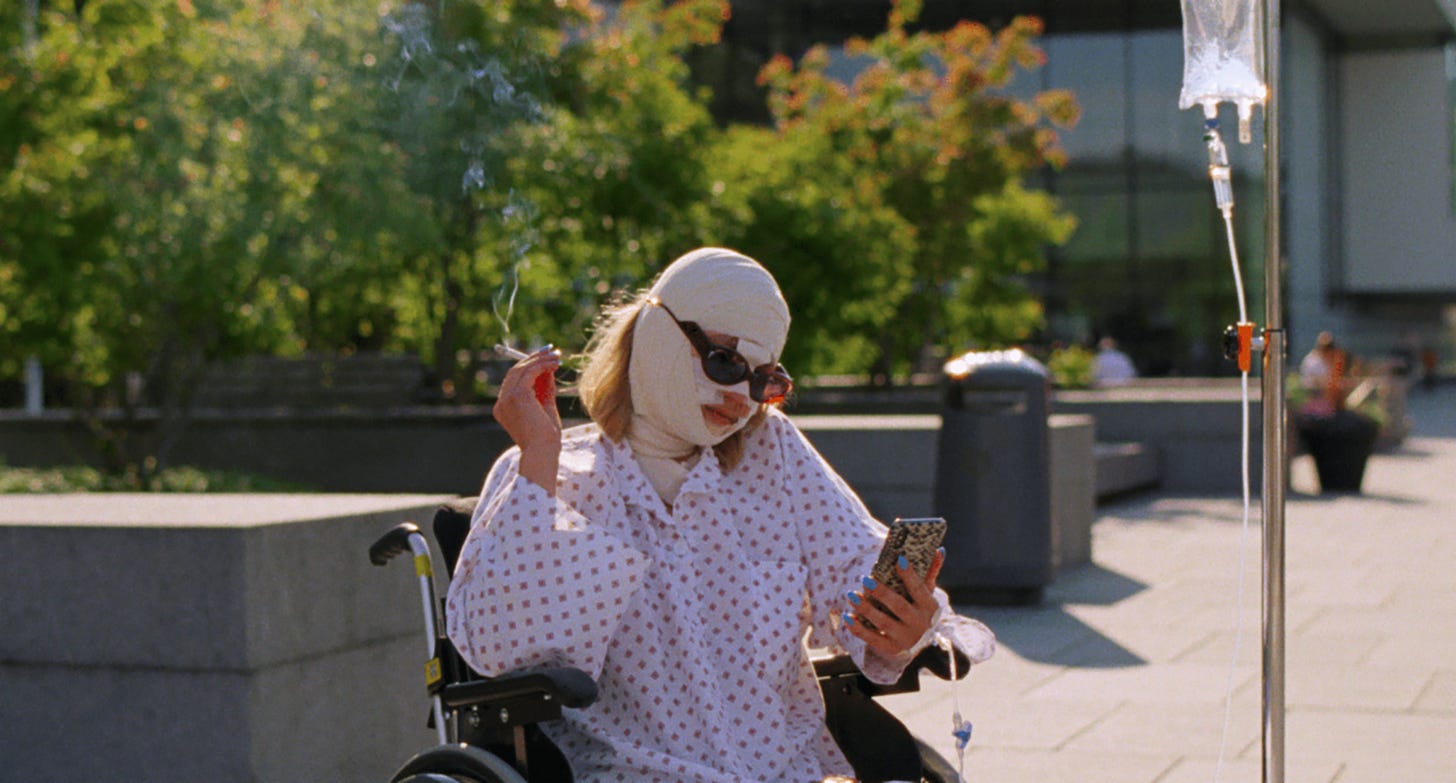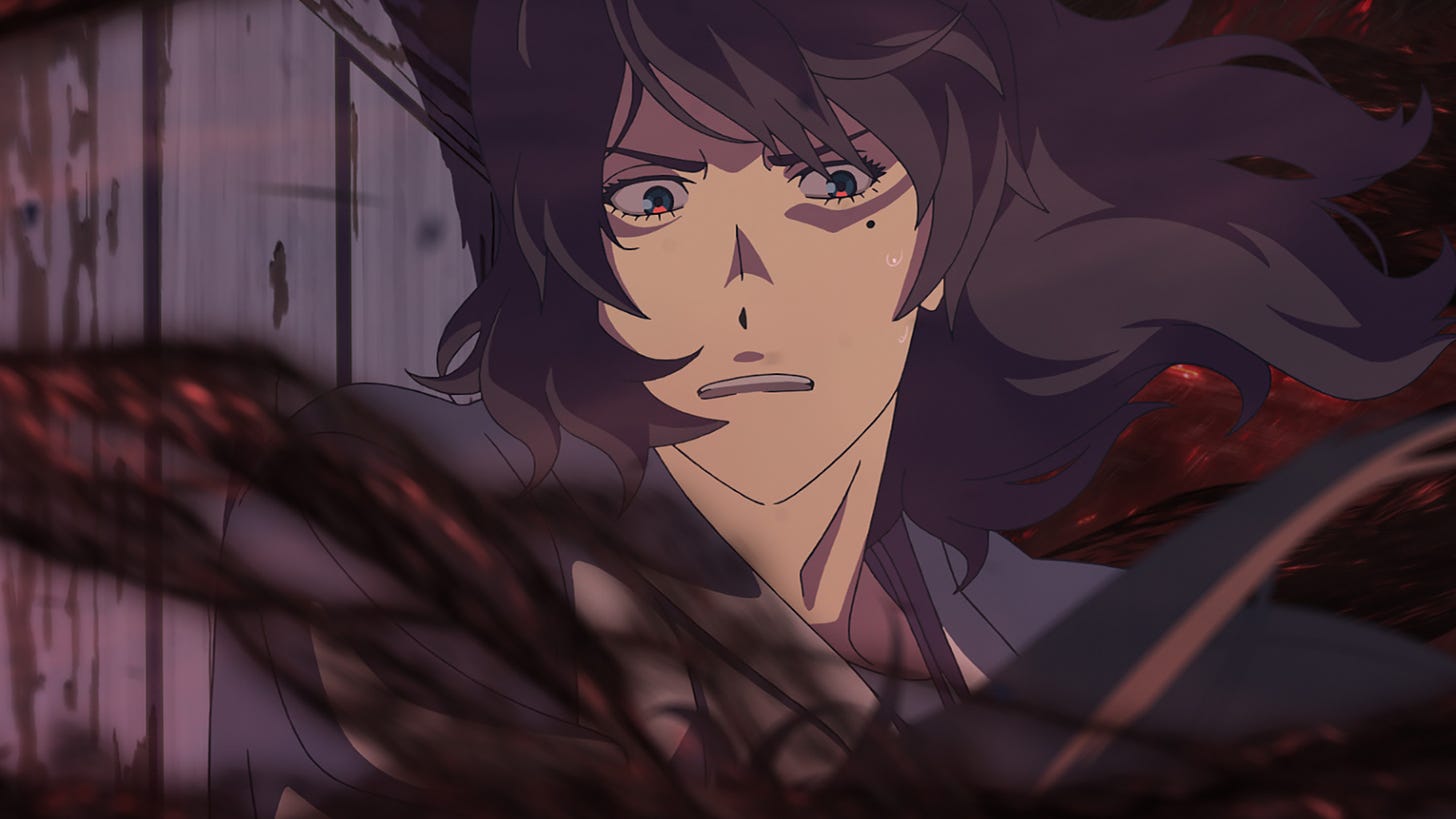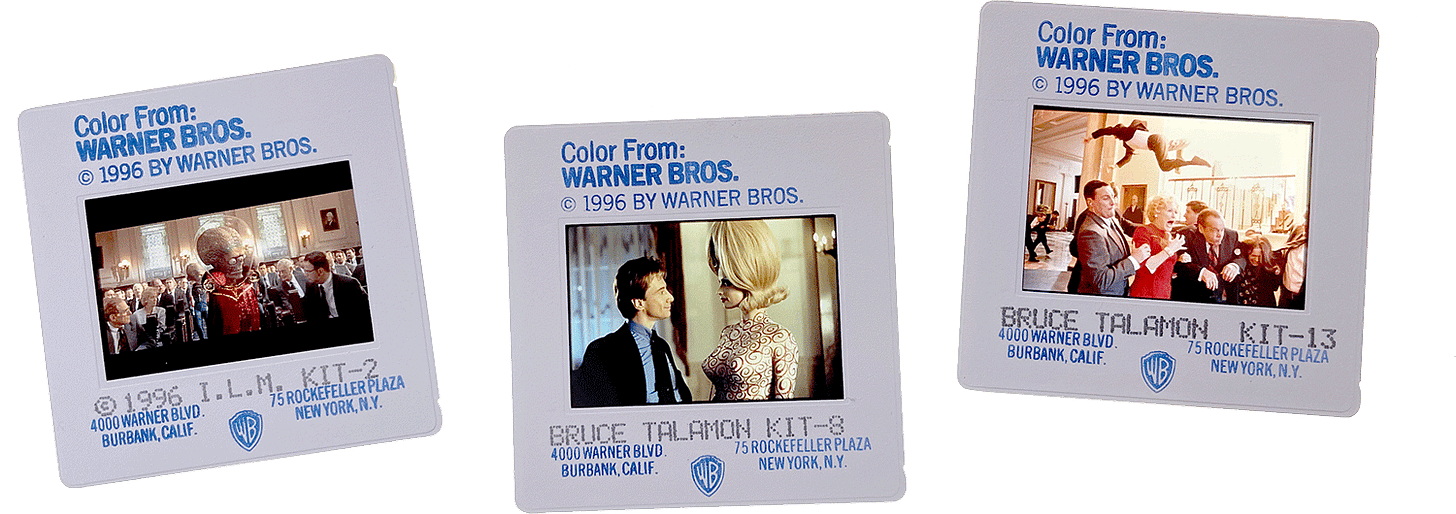The Sabres’ season has once again ended just as the temperature starts holding in 60s here in Buffalo. And while next year brings legitimate expectations of going further for the first time in thirteen years, that means I’ll probably have more free time at night right now to start a few of those shows I mentioned last week.
While I crossed one off the list (BEEF), plenty more have taken its place (the buzz on FROM has me wanting to catch-up to the first season as season two arrives and screeners for TOTALLY, COMPLETELY FINE; CITADEL; and BUPKIS alongside their varying levels of intrigue are currently in my inbox).
It only makes sense then that local theaters would also get eight new titles added today. The industry is ready to churn out as much content as possible with the school year winding down and the drive-in reopening. We’ll see how the MoviePass fares to maybe catch a few summer blockbusters, but it’s not looking good with new verbiage making it seem credits older than a month old will disappear rather than rollover. It makes sense only if I can commit to 2 a month. I’m not yet sure I can.
What I Watched:
BEEF: Season 1
(now streaming on Netflix)
It’s around halfway through Lee Sung Jin’s BEEF that things start to really come into focus. Whereas the opening few episodes were about escalating rage from pettiness to destruction, it’s here that the camera begins to turn away from Amy (Ali Wong) and Danny (Steven Yeun) to get a glimpse of the people around them. Because the whole concept of the show hinges on loneliness and how we all suffer from it regardless of our economic, social, or cultural station. Amy and Danny are pretty much the same person besides the fact that she’s been able to cultivate a persona that’s provided success while his façade always seems to turn everything he touches into garbage. And it is exactly when we realize this feud could end by them just talking to each other and realizing this similarity that the others’ struggles rise to the surface.
Amy’s husband George (Joseph Lee) isn’t the perfect, innocent soul she believes him to be. His mother (Patti Yasutake’s Fumi) isn’t the put-together success her composed presence and flowery art-speak assume. Danny’s brother Paul (Young Mazino) isn’t lazy as much as unmotivated due to a life of invisibility. And while Amy’s neighbor (Ashley Park’s Naomi) might be everything she strives for, it’s one thing to admire and crave something and another to actually live it. So, what starts out as a war between two angry and depressed black holes sucking in collateral damage with every new act of revenge becomes much more external. Jealousy and ignorance and desire push those on the periphery to become main players, raising the stakes to the point where Amy and Danny couldn’t stop if they wanted.
With no end in sight, things snowball to some dark and violent places I’ll admit I didn’t see coming. I should have, though, considering the first work that came to mind while watching was CATFIGHT. Onur Tukel’s wild farce goes to some extremes too, but it also presents an atmosphere of heightened reality and fantasy that BEEF doesn’t until casual mentions of crows talking to each other receives a humorous payoff. We instead feel as if Amy and Danny’s moves are happening in a world with consequences and sense—like they’ll eventually wake up and see that their actions are destroying their own lives worse than their nemesis. As I explained above, though, they cross a point of no return that renders any ceasefire temporary. The truth of how far they went will ultimately push the other to see so much red that they will unintentionally risk the lives of those they love too.
That’s a captivating and important pivot—one that appears to skew more towards the profoundly emotional scene of Danny crying in his return to church than the chaotic uncertainty of his cousin Isaac’s (David Choe) criminal proclivities. Maybe it’s because I looked forward to that shift to heavier subject matter and weightier cause and effect that the choice to go towards comic horror in “The Great Fabricator” got me sighing despite some legitimate gasps. The humor had been augmenting the tragedy before that episode and suddenly it started to subvert it in ways that didn’t quite mesh with the experience I had been enjoying up until that point. “The Drama of Original Choice” is so good that following it with a climactic penultimate chapter playing as fast and loose as the Vegas escapades in “Just Not All at the Same Time” gave me whiplash.
Thankfully, “Figures of Light” re-grounds things. Even with the fun visual treatment of drug/poison effects, we finally get Amy and Danny speaking truth without the games, deception, and self-delusion they hide behind with George and Paul respectively. It’s a brilliant finale with a keen desire to retain the mess of what these characters wrought while also providing them an avenue towards self-acceptance. Jin and company never pretending that the stakes can be avoided is my favorite part of the show. He makes them feel the pain of their actions and fall prey to the anguished prison of their minds that forces them to always choose war. Wong and Yeun are phenomenal—especially in those moments of clarity about their own wretchedness. Add a killer soundtrack (I’m a child born in the 80s like their characters) and it was easy to get swept up into the emotional insanity.
- 8/10
DE HUMANI CORPORIS FABRICA
(now in limited release)
Lucien Castaing-Taylor and Verena Paravel’s LEVIATHAN was a spectacular film. It placed us into the commercial fishing industry with a subjectively objective eye towards the reality of its world and the beauty of its chaos. Their latest collaboration seeks to do the same in the world of Parisian hospitals. With footage shot in eight different establishments, they “use the tools of medicine to create cinema” in a sort of reverse of how the medical world has utilized cinematic tools to help advance medicine. But while you definitely get a sense of that fly-on-the-wall nature with the banal conversations of doctors and uncouth demeanor of surgeons that confirms the running joke in SCRUBS about how surgeons are the “jocks” of the medical field, DE HUMANI CORPORIS FABRICA is missing LEVIATHAN’s sense of awe.
Have I ever witnessed eye surgery or seen someone stick tubes down a man’s penis before? No. But I have been to a hospital. I have seen hospital-set TV shows and films. So, while it is new to watch a real doctor shove her entire arms into a real pregnant woman’s belly to retrieve a baby, it’s not something I couldn’t have imagined pretty accurately. Same with the visual comparisons alternating between a scope inside a human’s intestines, a container shooting through a hospital’s pneumatic tube system, and security guards wandering off-limits and graffitied catacomb-like hallways. These are obvious parallels and ubiquitous notions of “the machinery” behind “the art.” To spend two hours inside such mundane maneuverings isn’t therefore as profound in its desire to shed light on “life” as transporting me somewhere I’ll never go myself.
That’s not to say the journey isn’t worthwhile, though. I loved the candid dialogue during a prostate removal wherein the surgeon admits he isn’t an expert while others reveal they have no clue what they’re doing. One even drops the suction tube on the floor, rendering it unusable as everyone scrambles to find an alternative due to blood pooling as a result of an internal contusion that needs stitching. That’s the sort of content that you can’t get anywhere else. You can examine a placenta and a cancerous tumor on YouTube. You can’t find unedited and unsterilized video of medical doctors treating the human body as an inert object to rip open with lasers and their own hands. Ditto with a wild closing sequence inside one hospital’s hedonistic-themed “salle de garde” with frescoes that seemingly depict the staff in lewdly sexualized poses on the wall while Orgy’s “Blue Monday” cover blares.
So, there are definitely moments that prove unforgettable—just not as many as LEVIATHAN or Castaing-Taylor’s SWEETGRASS. Maybe that’s on me due to my first-hand experience with hospitals making it so I can’t pretend to be as ignorant as I am about commercial fishing or sheep herding, but unfamiliar looks at the familiar can’t help feeling familiar due to proximity and pop culture awareness. It may take on a more visceral sheen being that what we’re seeing is real as opposed to Hollywood prosthetics and computer graphics, but it’s not necessarily “uncharted territory.” And that’s what it needs to be to keep my attention when there’s no story beyond the distractingly dull narrative of two senior women roaming a public assistance facility while a man tries to escape his room. My mind too often wandered whenever we weren’t lost inside someone’s flesh.
- 6/10
LINOLEUM
(now on VOD/Digital HD)
The mind is a curious thing. Especially when you don’t have a “brain toothbrush” as Dr. Alvin (Tony Shalhoub) would say. It’s what makes Cameron (Jim Gaffigan) so affably charismatic and yet so awkwardly detached. He’s an astronomer who dreamt of being an astronaut—constantly looking up at the stars despite always wanting to swim through them. It’s the same with life. Cameron was inspired to create a television program with his wife Erin (Rhea Seehorn), teaching kids about science in fun ways that only cemented their love. But now he does it alone, shunted off to the midnight slot, while she’s gone buttoned-up and serious working at a museum. Their daughter Nora (Katelyn Nacon) sees it too. She struggles with that chasm between being what society demands and braving its ire by choosing what she wants instead.
Colin West’s LINOLEUM takes a heightened, almost fantastical look at this trio trying to find footing in a world that labels them outcasts. Do they lean into the designation to accomplish something fantastic (no matter how small or personal “fantastic” may prove)? Or do they buckle to the pressure and “grow up” into something more respectable than happy? Add Nora’s new classmate Marc (Gabriel Rush) to the equation—son of Cameron’s more successful yet less understanding doppelgänger who just moved to town to take over his show—and the parallels become unavoidable. Two pairs striving to find common ground. To survive expectations. To throw caution to the wind. It becomes like looking at a mirror into the past and/or future to discover it’s never easy. But it doesn’t need to be impossible either.
I don’t want to say too much since the climax packs an affecting punch once clarity arrives in the form of contextual repetition and overt connections. I’ll just say that West is telling a non-linear story through a linear filter that, as he puts it, centers “tone” rather than “time.” The experience is therefore akin to jumbled memories—a scrapbook with the pages shuffled. The people are the same and the motives consistent, but the package must take on a life of its own to find sense amidst the chaos. Maybe that arrives in the form of outlandish events like a car falling from the sky or a spaceship lodging itself in Cameron and Erin’s backyard. Maybe it’s having Gaffigan play dual roles with a purpose beyond just the gag of everyone saying they look alike. Maybe it’s the woman (Elisabeth Henry) always watching Cameron and Marc from a distance.
Bring in Cameron’s dementia-riddled engineer father (Roger Hendricks Simon) to perhaps assist in transforming those space scraps into a rocket inside his garage and the pieces of the puzzle start to fall into place. I guess it might be more accurate to say the puzzle starts to separate into multiple pictures that should actually be read in sequence rather than simultaneously. The main quartet of Gaffigan, Seehorn, Nacon, and Rush are fantastic with the quirky comedy shifting to a profoundly poignant realization that dreams don’t have to be won all at once or in their initial forms. The filmmaking had me recalling DONNIE DARKO at times with the script’s structure reminding me of the underseen BOYS IN THE TREES. It’s a thrilling, sometimes heavy, drama about love, identity, and individuality that takes you to the ever-expanding universe of us.
- 8/10
MAFIA MAMMA
(now in theaters)
Can someone get Catherine Hardwicke a good script? Anyone? I’m not Italian, but I can’t imagine that J. Michael Feldman and Debbie Jhoon’s screenplay for MAFIA MAMMA isn’t at least partially offensive in its stereotypical depiction of Italians constantly spitting when saying the name of someone they hate or becoming homicidal whenever someone says they never saw THE GODFATHER. You must wonder if Amanda Sthers’ original story was buried under a stack of papers in the 1990s and recently unearthed by producers who haven’t seen a comedy since. The whole thing literally hinges on the dated play-on-words of “Eat, Pray, Fuck.” Kristin (Toni Collette) is sick of her misogynist boss and cheating husband with no one to keep her invested in her life now that her son left for college. So, why not head to Italy for some oat sowing?
The answer: because accepting Bianca’s (Monica Bellucci) invitation to attend her grandfather’s funeral involuntarily means also accepting the late patriarch’s wish of inheriting the family business—the family mob business. It therefore becomes more “Eat, Pray, Survive” now that the rival Romano family smells blood in the water. Everyone believes it’s open season because an American woman has taken over. Even Kristin’s loose cannon of a second cousin (Eduardo Scarpetta’s Fabrizio) believes it and strives to take the crown for himself. It’s not like she wants it anyway. All Kristin desires is a night alone with the hot Italian she met at the airport (Giulio Corso’s Lorenzo) to put her old life in the rearview. Doing so just isn’t that easy when everyone is trying to kill you.
It’s a generically familiar concept with a fish-out-of-water proving (accidentally or not) to be the perfect person for a high pressure, dangerous job. Luck plays a big role in keeping her alive at first, but rage and clarity soon follow as all the chauvinism Kristin has let rule her life finally comes into focus at a time when she’s her most confident and ruthless as far as turning the tables. Collette is having a blast with the character’s rapid shifts from serious businesswoman to smiling hostess, but it’s all so predictable. You might not know who some people will reveal themselves to be, but you will definitely know they aren’t who they say. Everything and everyone are thus pawns waiting to expose his/her secret or die so someone else can. And we’re meant to not care about such contrivances because Kristin’s need for gnocchi and sex trumps all.
So, we watch the uninteresting gunplay and stomach the machismo of big men with heavy accents pausing to earnestly appreciate a good bag of Costa Rican snacks. We pretend like we don’t know Fabrizio isn’t drawn like a cartoon so that he can betray them all in the end or that Lorenzo isn’t the perfect romantic interest so he can become someone else. It’s a front-to-back game of belief suspension that simply isn’t funny or entertaining enough to not get bored when those obvious revelations take too long to come to fruition. Even Bellucci is wasted in a side role meant to do little but show Kristin what she might become with self-worth. They may be written like caricatures, but Alfonso Perugini and Francesco Mastroianni are the lone bright spots as Kristin’s silly bodyguards. The rest is just lowest common denominator hijinks in a Hollywood-approximation-of-Italian package.
- 4/10
SAKRA [Tin lung baat bou]
(now in limited release; hits VOD/Digital HD on 4/18)
With six credited writers, Donnie Yen’s passion project hardly seems to have been an easy adaptation. Choosing to focus on one of three main characters in Jin Yong’s Demi-Gods and Semi-Devils, Yen and co-director Ka-Wai Kam’s SAKRA take us back to the warring Song and Liao Empires to follow the exploits of the region’s most respected and unbeatable hero Qiao Feng (Yen). A master of martial arts at a young age, Feng is currently the leader of the Beggar’s Sect with use of the fantastical “18 Dragon Subduing Palms” and a compassionate soul quick to offer his enemies a helping hand after soundly beating them into submission. So, it’s an unfamiliar feeling when his world suddenly turns its back on him with homicidal ambitions. Rumors state Qiao killed one of the Sect’s own, then his parents, and then his master. People say he’s a Khitan spy who learned the Song ways to defeat them from within.
The first hour is Qiao’s quest to uncover the truth of these heinous crimes left at his feet and get his comrades back on his side after unluckily being found at the wrong place at the wrong time more than once. Because anyone who dares to challenge him ends up on his back, however, he roams freely to gather facts and meet new acquaintances along the way. One is Azhu (Chen Yuqi), a young woman working for the Yan Empire and its leader Murong Fu (Wu Yue) when she finds herself mortally wounded. In order to save her, Qiao will need to let his life become forfeit in exchange. He won’t just let his old friends kill him, though. He will instead mutually relinquish his bonds of brotherhood with them to fight one against a hundred without holding back. His hope is to either be the last man standing or first to shake hands with them all in the next life, as friends once more.
The second hour is Qiao’s journey towards revenge—both for the crimes he’s being accused of committing and the murder of his parents thirty years ago that left him the adopted son of a Song family. This narrative is much more complex than act one’s straight line to oblivion with new characters (Eddie Cheung’s Duan Zhengchun and Cya Liu’s Azi) introduced and more clarity on the topic of Qiao and Azhu’s familial pasts. Because Bai Shijing (Du Yuming) and Kang Min (Grace Wong) still want Qiao’s head on a platter, everything begins to overlap with Azhu’s penchant for disguising herself as anyone else (with MISSION: IMPOSSIBLE level masks) confusing things even further. It’s not too difficult to keep up, though. At a certain point you can simply agree that Qiao is the protagonist and anyone not by his side is worthy of death (unless they eventually join him later).
Regardless of that chaotic drama (not to mention multiple epilogues setting up sequel potential while finally showing why the soon-to-be sixty-year-old Yen cast himself as thirty), however, the real draw is the action and fight choreography. If you need convoluted secrets and a plot to frame the world’s greatest hero as its most despicable villain to get countless people to want to battle Yen, so be it. Because the wirework and special effects paired with the speed at which everyone on-screen is operating makes the dizzying battle scenes exhilarating. Whether with swords, sticks, fire, or wind, they jump on rooftops and walk up walls to gain leverage for physically punishing kicks that throw victims through brick walls. Qiao might be a genial Robin Hood at the start, but witnessing mankind’s cruelty soon allows him to do whatever is necessary for justice.
- 7/10
SICK OF MYSELF [Syk pike]
(now in limited release)
Always the accomplice in her artist boyfriend’s crimes despite never receiving public of private credit, Signe (Kristine Kujath Thorp) has had enough. Thomas (Eirik Sæther) is starting to take off with gallery shows and magazine interviews that talk about his art (resculpted furniture he and Signe stole from posh stores) with an air of genius. And there she is constantly being pushed aside by more “important” people to the point where everyone in a room who doesn’t already know her assumes she’s his sister because he refuses to introduce her at all. Signe cannot stand his narcissism and thus narcissistically begins to sabotage his events so the light can shine on her too. It’s not enough, though. Society only truly turns its head for train wrecks. So, a train wreck is what she becomes.
Kristoffer Borgli’s SICK OF MYSELF therefore starts small. First, it’s about helping Thomas in his insane stunts if he agrees to give her credit. He doesn’t. Then it’s doing an actual brave, good thing by coming to the aid of someone in need. Signe plays up the heroism (like most would), but eventually takes it too far when she refuses to acknowledge that bringing it up over and over again with the same handful of acquaintances only makes her look desperate. So, she dabbles with health issues—feigning an allergy in a room of strangers to finally reap the rewards of stealing all the attention that was supposed to be reserved for Thomas. Pity is the key. Theatrics and an audience ignorant to her psychopathy is crucial to conjuring it. A quick Google search later and she’s abusing Russian anxiety medication for its side effect: a heinous and scarring rash.
It’s an hilariously absurd premise that reveals just how pathological her yearning for fame and importance is. Not only is Signe putting an unregulated substance in her body that’s doing how many other horrible things below the surface of her skin, but Thomas is embracing his own attention so immensely that he believes himself above the law. Everything they do and say becomes a byproduct of a “brand” that exists for no other reason but exposure. It’s not about Thomas’ work being seen. It’s about how it’s seen. It’s not about Signe becoming the focus of everyone who reads the local paper. It’s about monetization and global reach. These deluded souls are so self-absorbed that they become jealous enough of each other’s reach to act in ways that compromise their own dreams of grandeur.
The darkly comic tone won’t be everyone’s cup of tea, but it will definitely tickle those who embrace its unorthodox commentary. Signe is prone to daydreams depicting how she believes her next moves will unfold—nightmares causing her to ignore reason and double down or fantasies that only find her waking up to a new and unexpected ailment she’ll always try to exploit before thinking about finding a solution. It has enough to say about mankind’s obsession with celebrity and capitalist greed's manipulation of the disadvantaged for profit to give the whole value beyond just the satirical nature of its narrative, but I think its success on that superficial level makes it worth a look too. Sometimes it’s nice to spend an hour or so with truly deranged characters to know our own egos can always be worse. Better to laugh at the cautionary tale than become one yourself.
- 7/10
SUZUME [Suzume no tojimari]
(now in theaters)
Suzume (Nanoka Hara) always believed a vision of her younger self running through fields of green to find her mother was a dream—an illusion created by grief that merged the acceptance of her mother’s death with the return of a memento she would cherish ever since. A chance meeting on the way to school twelve years later changes all that, though. Something about Souta (Hokuto Matsumura) and his search for “ruins” and a “door” sparks a desire to follow him and see a glimpse of that stifled memory amidst the unexplainable chaos of disaster. Because through that frame is a window onto the world from her childhood as well as a gateway allowing for the appearance of a red worm roiling with portentous brimstone. Suzume must help Souta close and lock it to save the city from destruction.
As expected from a Makoto Shinkai film, SUZUME is about much more than just a mysterious hero shutting doors to stave off earthquakes and tsunamis. It’s about loss and love, past and future. We embark on a crazy adventure across Japan to let those themes shine through after a magical cat (Ann Yamane’s Daijin) inexplicably turns Souta into the chair Suzume’s mother made her as a child. With Instagram as their map (Daijin leaves a trail of fans wherever they go), our heroes must do what they can to enlist help without giving scaring anyone off the fantastical nature of their quest. Each new place introduces a friend for Suzume and struggle for Souta as it seems his ability to remain conscious wanes the longer he stays a chair. They chase Daijin, see the worm threatening to escape its prison and slam into the earth, and lock more doors in hopes they can stem the tide.
What they don’t know yet is that doing so demands sacrifice—something Japan understands all too well. As Shinkai reveals more of the mythology at the back of this journey, we realize the 2011 tsunami is the cornerstone moment connecting everything. That’s when the worm last completely ravaged the country, leaving multiple areas abandoned and/or designated unsafe. With the help of two God-like “keystones”, “closers” like Souta were able to stop the carnage and trap it once again. Now, with one of those “keystones” missing, it becomes a race against time to prevent another large-scale catastrophe. Where Souta’s key and incantation is enough to close entry points and cease rumblings, however, more is necessary to keep the worm in chains and provide the nation a future even when one seems impossible for those struggling to juggle life’s responsibilities and pleasures.
The result is a gorgeous and emotionally heavy tale of longing and understanding on behalf of Suzume. Her path proves a cyclical one where past and future unite in the so-called “Ever After”—a place beyond time where inspiration lies in as much abundance as the worm’s despair (the latter of which is rendered in a way that recalls the NieR games with dilapidated locales and giant red/black monsters needing to be quelled by the light of memories and voices left behind). Suzume, like everyone else on-screen, is balancing expectation with desire. She’s putting the wellbeing of others in front of her own as she searches to find what she lost and preserve what she’s found even if it’s sometimes hard to separate the two. The humor of a talking chair and heartache of trauma combine to entertain and enlighten en route to a climax as personal to Suzume as it is universal to mankind.
We all worry about whether we’re doing enough. We all walk on eggshells like Aunt Tamaki (Eri Fukatsu), desperate to give the next generation security even if it means sabotaging our own happiness to do so (well, not all of us when you consider half of America seems more than content to drain the Earth of its natural resources and stability while leaving their children and grandchildren to face the consequences alone). It’s about passing down hope in the face of hopelessness. Letting a young Suzume know that it’s okay to keep moving forward. That doing so doesn’t mean she’s turning her back on her mother’s impact or memory. It’s about standing in front of pure devastation and fearlessly embracing the challenge, knowing what’s at stake goes beyond our own life. Because we never fully disappear. We remain a part of the people and places who live on.
- 9/10
WILD LIFE
(now in limited release before its National Geographic Channel broadcast debut on 5/25; streams on Disney+ starting 5/26)
“He didn’t have billions or anything like that, but he had like one hundred and fifty million dollars to do this one thing.”
It’s a crazy line of dialogue shoehorned in without fully grasping the context that one hundred and fifty million is a billion to the common person. When you’re dealing with a story populated by rich people and their friends, however, it’s easy to lose sight of that. It should therefore fall on directors Jimmy Chin and Elizabeth Chai Vasarhelyi to bridge the gap and directly acknowledge this conservationist dream is built on the back of billion-dollar capitalist engines. You can’t just simply mention that Doug Tompkins started and sold The North Face before running his first wife’s fashion line Esprit while Yvon Chouinard created Patagonia as though these companies are boutique entities and not the providers/benefactors of promotional assistance by literally clothing everyone on-screen. WILD LIFE is trying to separate church and state by ignoring the connection, but doing so only makes it more prevalent.
Does this truth render the mission of the documentary moot? No. This is a well-compiled look into Doug and Kristine Tompkins’ quest to save Chilean rainforests at a time when people of their station (she’s a former CEO of Patagonia) generally help destroy them. With archival and home video footage paired alongside newly shot first-hand accounts from all parties except Doug (who tragically died in 2015), we really get a sense of the struggle they endured to shed themselves of that reality’s inherent preconception. Because why should the Chilean government, military, or citizens believe these wealthy Americans didn’t have a hidden agenda? When has anyone in their position ever done the right thing without first securing a means of profiting off it for themselves? To watch this film is to realize that they truly were the exception to prove the rule.
Would I have liked a bit more in-depth analysis of the shift in philosophy besides Doug having an epiphany when on a nine-month mountain climbing vacation with his friends (afforded to him solely because he had money to burn)? You bet I would. But that’s not Chin and Vasarhelyi’s goal. That’s never been their goal in this medium. MERU, FREE SOLO, and THE RESCUE didn’t necessarily have that aspect waiting in the background, begging to be explored, though. So, you do have to wonder if their involvement here (Chin is an acquaintance if not a friend who climbed mountains with Tompkins in the past) is precisely because they wouldn’t feel the need to conduct that exploration. They’ll allow euphemisms and corporate speak to gloss over what it takes to be as successful as these people were. They’ll let Doug’s nearest and dearest laugh away his checkered past with a shrug and blanket “He changed.”
And that’s fine since everything about WILD LIFE bills it as Kristine’s mission to finish what she and Doug started after his death. It’s about buckling down and making tough decisions that they admit caused some heavy professional arguments which in turn proved how strong their personal love for each other was. All that other stuff is pushed to the side in an attempt to render it exposition rather than the more interesting entry point into the story. We’re meant to appreciate the Tompkins more because of what they’re willing to spend their fortune on since remembering that fortune exists and delving into what else it’s being spent on threatens to derail the good vibes being cultivated. My biggest takeaway from the whole is therefore optics. This is a feelgood story with some effectively heartfelt and honorable machinations, but it’s also a mostly superficial puff piece that can’t quite shake its public relations air of artifice.
- 6/10
New Releases This Week:
(Review links where applicable)
Opening Buffalo-area theaters 4/14/23 -
THE LOST WEEKEND: A LOVE STORY at Dipson Amherst
MAFIA MAMMA at Dipson Amherst & Capitol; Regal Elmwood, Transit, Galleria & Quaker
Thoughts are above.
NEFARIOUS at Regal Elmwood, Transit, Galleria & Quaker
THE POPE’S EXORCIST at Dipson Flix & Capitol; AMC Maple Ridge & Market Arcade; Regal Elmwood, Transit, Galleria & Quaker
RENFIELD at Dipson McKinley Mall, Flix & Capitol; AMC Maple Ridge & Market Arcade; Regal Elmwood, Transit, Galleria & Quaker
SHAAKUNTALAM at Regal Elmwood & Transit
SUZUME at North Park Theatre; Dipson Flix & Capitol; AMC Maple Ridge & Market Arcade; Regal Elmwood, Transit, Galleria & Quaker
Thoughts are above.
SWEETWATER at Dipson Flix & Capitol; Regal Elmwood, Transit, Galleria & Quaker
Streaming from 4/14/23 -
KIDS VS. ALIENS - Shudder on 4/14
“KIDS VS. ALIENS provides a rollicking good time with tweens swearing up a storm as bodies fall left and right. And while I assumed it would embrace that sense of fun absurdity, I didn't anticipate how impressive the stakes might prove.” – Full thoughts at HHYS.
THE LAST KINGDOM: SEVEN KINGS MUST DIE - Netflix on 4/14
WEATHERING - Netflix on 4/14
LONGEST THIRD DATE - Netflix on 4/18
NO BEARS - Criterion Channel on 4/18
“It's a scathing commentary on political and familial oppression packaged as a dual romance on an unavoidable fast-track towards tragedy.” – Full thoughts at HHYS.
MIGHTY MORPHIN POWER RANGERS: ONCE & ALWAYS - Netflix on 4/19
QUASI - Hulu on 4/20
Now on VOD/Digital HD -
BUNKER (4/11)
EMILY (4/11)
“EMILY is a gorgeous film—emotive, thrilling, and also quite charming whenever it pairs Emily up with another to wryly smile while others scowl at them. Mackey performs the role with an infectious energy that runs through the highs and the lows.” – Full thoughts at HHYS.
FEAR (4/11)
JESUS REVOLUTION (4/11)
“If it wasn't all in service of public relations, I might even say it's good. But we live in an era where bigots and racists hide behind religion to persecute, control, and kill. Good propaganda might be well-made, but it's still propaganda.” – Full thoughts at HHYS.
LEDA (4/11)
“It's definitely not the sort of thing you'd want to walk into blind off the street, but those already interested in Greek mythology and poetically abstract films should at least appreciate the effort if not the whole package.” – Full thoughts at HHYS.
LINOLEUM (4/11)
Thoughts are above.
NEW GODS: YANG JIANG (4/11)
NO BEARS (4/11)
“It's a scathing commentary on political and familial oppression packaged as a dual romance on an unavoidable fast-track towards tragedy.” – Full thoughts at HHYS.
ONE FINE MORNING (4/11)
PUNCH (4/11)
THE STRANGE CASE OF JACKY CAILLOU (4/11)
CHANTILLY BRIDGE (4/14)
ONCE UPON A TIME IN UKRAINE (4/14)
ONE OF THESE DAYS (4/14)
ONE TRUE LOVES (4/14)
RARE OBJECTS (4/14)





